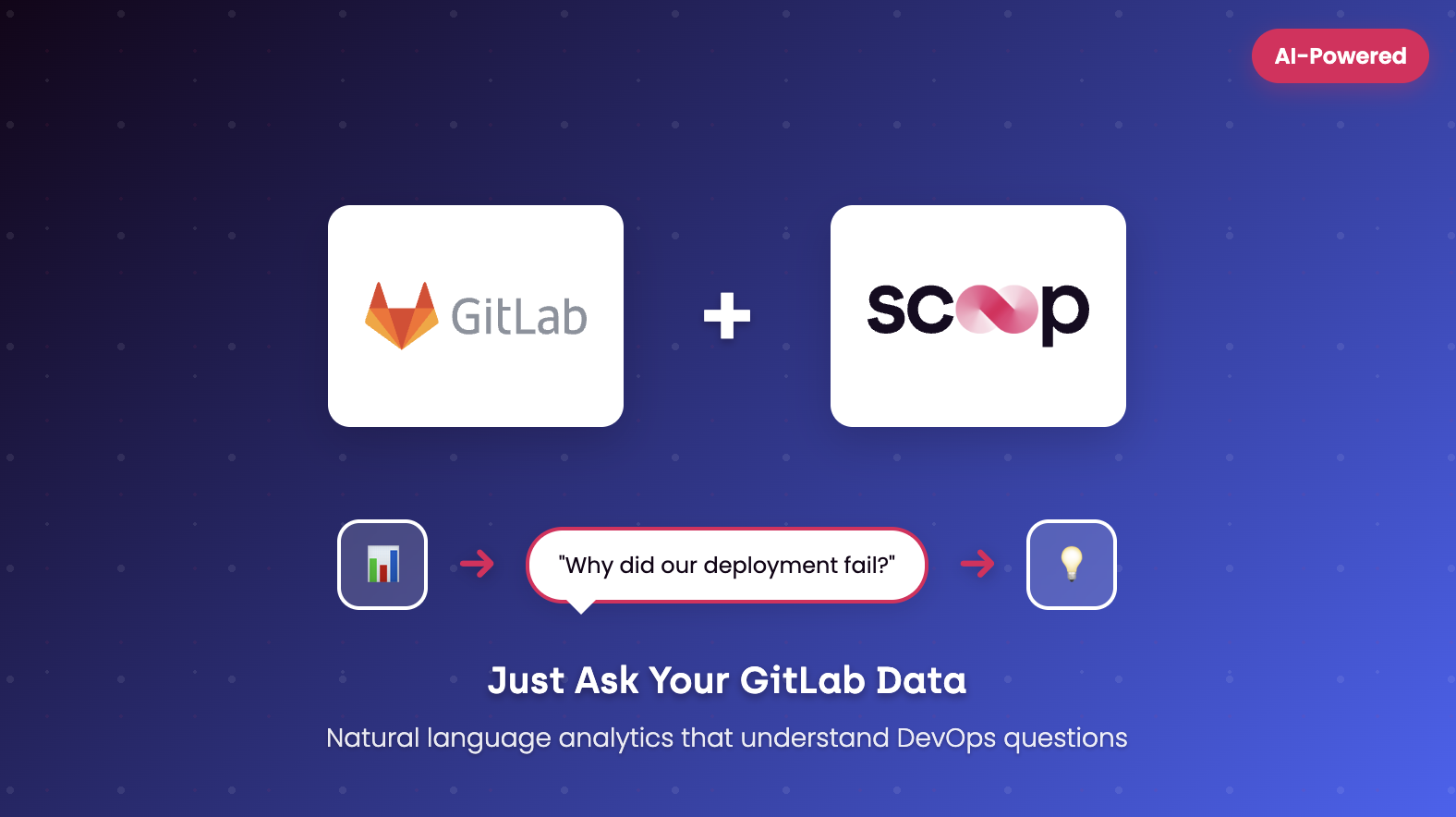The Challenge: GitLab's Rich Data, Limited Accessibility
GitLab captures an incredible amount of data about your development process. Every merge request, pipeline run, code review, deployment, and security scan generates valuable insights about team productivity, code quality, and delivery performance. But accessing these insights often requires:
- SQL expertise to query GitLab's database
- Dashboard building skills to create meaningful visualizations
- Time and technical resources that most development teams don't have
- Data analysis experience to interpret complex metrics
Meanwhile, the questions development teams actually want answered are surprisingly simple:
"Which merge requests are most likely to cause deployment failures?"
"What patterns predict when our CI/CD pipelines will be slow?"
"How does code review thoroughness correlate with production incidents?"
These are the kinds of insights that can transform how teams work—but they've been locked away in GitLab's data, accessible only to those with advanced analytics skills.
The Solution: Conversational Analytics for GitLab Data
Scoop Analytics changes this completely. By connecting to your GitLab data, Scoop enables any team member to explore insights using natural language—no SQL, no dashboards, no technical expertise required.
Here's how it works:
1. Connect Your GitLab Data
Getting your GitLab data into Scoop is straightforward—simply export your GitLab analytics data as CSV files and upload them to Scoop. We're also working on direct API connectivity (let us know if you're interested in being an early adopter!).
2. Ask Questions in Plain English
Instead of building complex queries, team members can ask questions like they're talking to a colleague:
- "Show me merge requests that took longer than usual to deploy"
- "Find patterns in our failed pipeline runs this month"
- "Which team members' code gets the most thorough reviews?"
3. Get Instant Insights
Scoop's AI understands the context of DevOps data and returns meaningful insights, complete with visualizations and explanations of what the data reveals.
Real-World Use Cases: GitLab + Scoop in Action
Engineering Managers: Understanding Team Velocity
The Question: "Why has our deployment frequency dropped over the last quarter?"
What Scoop Discovers:
- Pipeline duration has increased 40% due to new security scanning steps
- Code review cycles are taking 2x longer with the new team structure
- Merge request size has grown 60%, suggesting features aren't being broken down effectively
The Impact: The team implements smaller feature flags, adjusts the review process, and optimizes CI/CD pipeline steps, resulting in 30% faster deployments.
DevOps Engineers: Optimizing CI/CD Performance
The Question: "Which parts of our CI/CD pipeline are the biggest bottlenecks?"
What Scoop Discovers:
- Test execution time varies dramatically by repository (5min to 45min)
- Failed builds cluster around specific times of day when infrastructure is constrained
- Security scans account for 70% of pipeline duration but catch issues in only 3% of runs
The Impact: The team implements parallel testing, adjusts infrastructure scaling schedules, and optimizes security scanning to run only on changed files, reducing overall pipeline time by 50%.
Product Managers: Connecting Code to Customer Impact
The Question: "How does our code quality correlate with customer-reported issues?"
What Scoop Discovers:
- Merge requests with fewer than 2 reviewers have 3x higher revert rates
- Features deployed on Fridays have 40% more customer issues reported
- Code complexity scores directly predict support ticket volume for that feature
The Impact: The team implements mandatory review requirements, establishes deployment freezes before weekends, and creates code complexity alerts that help prevent problematic features from reaching customers.
Security Teams: Understanding Vulnerability Patterns
The Question: "What development patterns lead to the most security vulnerabilities?"
What Scoop Discovers:
- External dependency updates introduce 60% of detected vulnerabilities
- Certain developers consistently write more secure code (specific patterns identified)
- Security issues cluster in repositories with infrequent dependency updates
The Impact: The team creates automated dependency update schedules, implements security mentoring based on successful patterns, and establishes security champions in each development team.
The Power of Chat-Based DevOps Analytics
Accessible to Everyone
Product managers can understand deployment patterns without learning GitLab's query language. Developers can spot code quality trends without building dashboards. Engineering leaders can get instant answers to complex questions about team performance.
Contextual and Intelligent
Scoop understands GitLab's data model—merge requests, pipelines, issues, deployments, security scans. It knows that when you ask about "failed deployments," you want to understand the relationship between code changes, review processes, and production outcomes.
Collaborative Discovery
Teams can share insights instantly, building institutional knowledge about what works and what doesn't in their development process. Questions lead to follow-up questions, creating a culture of data-driven improvement.
Getting Started: GitLab Data + Scoop Analytics
Ready to start chatting with your GitLab data? Here's what teams typically explore first:
Week 1: Pipeline Performance
- "Show me our slowest CI/CD pipelines this month"
- "What causes our builds to fail most often?"
- "Which repositories have the most consistent pipeline performance?"
Week 2: Code Quality and Reviews
- "Find merge requests that bypassed our review process"
- "What's the relationship between code review time and bug reports?"
- "Which code changes are most likely to be reverted?"
Week 3: Deployment and Release Patterns
- "How does deployment frequency affect our incident rate?"
- "What features take longest to deploy to production?"
- "Find patterns in our most successful releases"
Week 4: Team Collaboration
- "Which team members collaborate most effectively in code reviews?"
- "How does team size affect merge request cycle time?"
- "What communication patterns predict successful feature delivery?"
Transform Your GitLab Data Into Strategic Advantage
GitLab gives your team incredible visibility into your development process. Scoop makes that visibility accessible, actionable, and collaborative. Together, they enable every team member to ask better questions, discover hidden patterns, and make data-driven decisions that improve both code quality and delivery speed.
The result? Teams that ship better software faster, with insights that were previously locked away in complex data structures now available through simple conversations.
Ready to start chatting with your GitLab data? Learn more about Scoop Analytics and see how development teams are transforming their DevOps insights from complex queries into simple conversations.
About Scoop Analytics: Scoop enables business teams to chat with their data in plain English, discovering insights that would be impossible to find manually. From GitLab DevOps data to sales metrics, Scoop makes advanced analytics accessible to everyone.








.png)